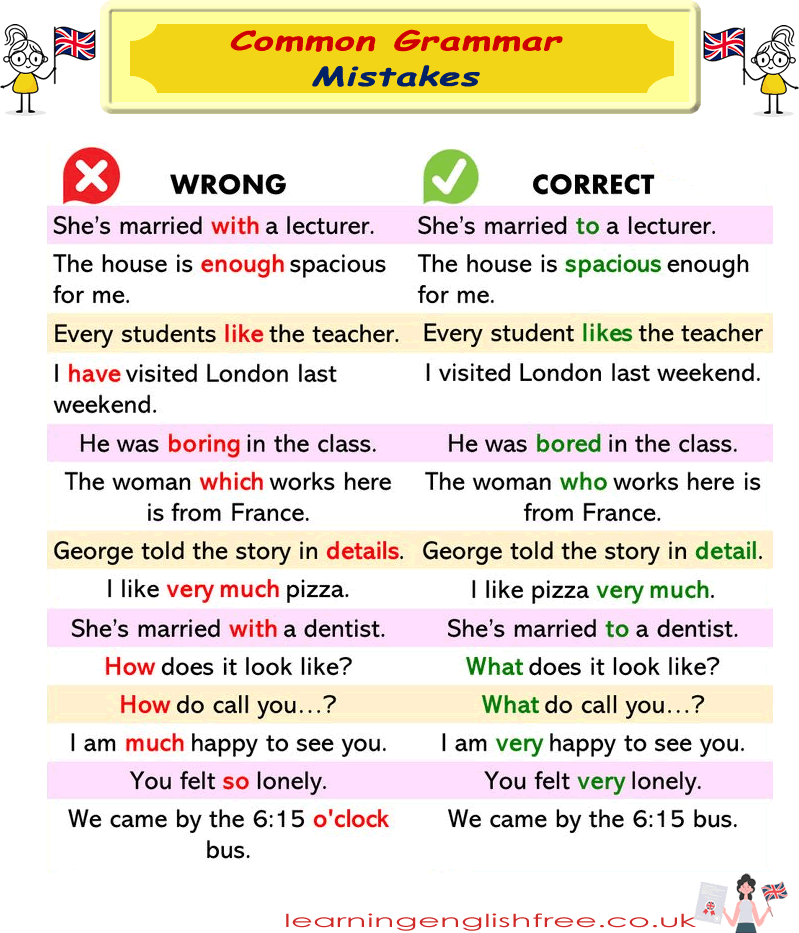
Unraveling the Mysteries of Grammar
Embarking on the journey of learning English can be both exhilarating and challenging. Among the myriad aspects that learners encounter, grappling with grammar stands out as a significant hurdle. Grammar, the backbone of language, can often be complex and nuanced, especially for those mastering English as a second language. This lesson aims to demystify some of the most common grammar mistakes encountered by ESL learners, providing clear explanations and practical solutions to help you navigate the intricacies of English grammar with confidence.
By understanding these common errors and learning how to correct them, you'll not only enhance your grammatical accuracy but also improve your overall communication skills. Whether you're writing an essay, engaging in conversation, or composing an email, a solid grasp of grammar is indispensable. Let's dive into some of the most frequent grammatical missteps and discover how to avoid them, thereby elevating your English proficiency to new heights.
Helpful Vocabulary for "Common Grammar Mistakes"
- Prepositions: Words used to express relations between nouns, pronouns, or phrases to other words within a sentence (e.g., to, with, on).
- Adjectives and adverbs: Adjectives describe nouns; adverbs modify verbs, adjectives, or other adverbs.
- Conjugation: The variation of the form of a verb in accordance with mood, tense, or number.
- Article usage: The application of 'a', 'an', and 'the' correctly in sentences.
- Subject-verb agreement: Ensuring the verb matches the subject in number (singular or plural).
Common Grammar Mistakes and Corrections
-
Wrong: She's married with a lecturer.
- Correct: She's married to a lecturer.
- Explanation: "Married to" is the correct prepositional phrase to describe the state of being married to someone.
-
Wrong: The house is enough spacious for me.
- Correct: The house is spacious enough for me.
- Explanation: The adjective "enough" should follow the adjective it modifies, not precede it.
-
Wrong: Every students like the teacher.
- Correct: Every student likes the teacher.
- Explanation: "Every" is singular and must be followed by a singular noun and verb.
-
Wrong: I have visited London last weekend.
- Correct: I visited London last weekend.
- Explanation: Use the simple past tense for actions completed at a specific time in the past, not the present perfect tense.
-
Wrong: He was boring in the class.
- Correct: He was bored in the class.
- Explanation: "Bored" is the correct adjective to describe someone's feeling; "boring" describes the person or thing that causes the boredom.
More Examples of Common Grammar Mistakes
-
Wrong: The woman which works here is from France.
- Correct: The woman who works here is from France.
- Explanation: "Who" is the correct relative pronoun to refer to people, not "which."
-
Wrong: George told the story in details.
- Correct: George told the story in detail.
- Explanation: "Detail" should be singular when used in this expression.
-
Wrong: I like very much pizza.
- Correct: I like pizza very much.
- Explanation: Adverbs of degree such as "very much" should follow the object or action they modify.
-
Wrong: She's married with a dentist.
- Correct: She's married to a dentist.
- Explanation: As with the first example, "married to" is the correct form.
-
Wrong: How does it look like?
- Correct: What does it look like?
- Explanation: "What" is the correct interrogative pronoun to use when asking for a description.
Summary and Takeaways
Mastering grammar is a critical step towards achieving fluency in English. By familiarizing yourself with common mistakes and their corrections, you can significantly improve your language skills. Practice is key to overcoming these hurdles. Consider writing sentences of your own, focusing on areas you find challenging, and then reviewing or having someone else check your work.
Engage in Self-Practice
Regularly practicing writing and speaking exercises can help cement your understanding of these grammar rules. Try creating examples that incorporate these common mistakes and then correct them. This exercise will not only reinforce your learning but also help you avoid making these errors in the future.
The Value of Correct Grammar
A clear grasp of grammar enhances your ability to communicate effectively and accurately. Whether in academic, professional, or casual settings, proper grammar is essential for making a good impression and expressing your ideas clearly.
Key Phrases to Remember
Familiarize yourself with key terms such as prepositions, adjectives, adverbs, conjugation, article usage, and subject-verb agreement. Understanding these concepts is crucial for identifying and correcting grammar mistakes.
Tips for Remembering
Use mnemonic devices, flashcards, and practice tests to reinforce your learning. Engaging with language learning apps and websites can also provide valuable practice and feedback.
Real-Life Application
Applying these grammar rules in your daily life, through both written and spoken communication, is vital for solidifying your knowledge. From emails and social media posts to conversations and presentations, take every opportunity to practice what you've learned.
Share Your Learning Journey
Join online forums, study groups, or social media communities focused on English learning. Sharing experiences and tips with others can provide additional insights and motivation.
Remember to visit our Facebook page at www.facebook.com/learningenglishfree.co.uk for more lessons, tips, and resources. Your journey to mastering English grammar is a marathon, not a sprint. With persistence and practice, you'll achieve greater confidence and competence in your English language skills.
